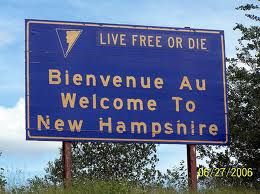One of the most audacious and cynical corporate-backed social experiments in living memory, the Free State Project in New Hampshire, has now shifted into damage control mode. Free State operatives learned this past week of my article that appears in the current subscription edition of CounterPunch, taking the first in-depth look at their plan to entice 20,000 out-of-state ultra libertarians and anarchists to move to New Hampshire and implant an extremist brand of free market capitalism: a brand the corporate backers hope will lead to a gutting of business regulations, environmental laws, and return the state to the right wing of the Republican fold. (Currently, all three branches in New Hampshire, known for its pivotal first primary status, are controlled by Democrats.)
An effort at damage control is playing out in the Free Staters’ internet pummeling of this author and a reporter at the Keene Sentinel newspaper in southern New Hampshire, Phillip Bantz, who made reference to the revelations in the CounterPunch piece along with an eyebrow raising quote from a Free Stater on legalizing cannibalism, a demand of some fringe Free Staters.
The attacks have not gone as planned. Over 128 reader responses are now registered in the Keene Sentinel, founded in 1799, which typically receives less than 20 responses to an article. Area residents, known for tolerance, are displaying pent-up fatigue and anger with the agenda of the Free Staters.
Some of the Free State participants call themselves anarcho capitalists, promoting an embrace of free markets and individual freedoms unencumbered by authority of the state. Free State members must formally agree to the premise that “government exists at most to protect people’s rights, and should neither provide for people nor punish them for activities that interfere with no one else.” [1] This premise is widely interpreted by Free Staters to mean all tax supported social welfare programs must go, along with zoning and planning and building inspectors. Public education would be replaced with home schooling or private schools.
What has been able to fly completely under the radar for the last seven years, is the role of shadowy think tanks and their corporate money backers in the Free State Project strategy.
On the morning of Friday, February 27, 2004, at the Washington D.C. corporate headquarters of the free market think thank, the American Enterprise Institute, this far-fetched plan was carefully rolled out to the national media. The key speaker at the event was Jason Sorens, founder of the Free State Project. Dr. Sorens is currently an Assistant Professor of Political Science at the State University of New York at Buffalo.
The following are excerpts of remarks made by Dr. Sorens at that event, according to a transcript available at the American Enterprise Institute:
“The Free State Project started as an effort to identify the best state in the country for people who favor smaller government and stronger individual liberties to move to…
We started signing up people in September 2001, and our growth was slow in our first few months. However, growth picked up dramatically in late 2002 and 2003, and by August 2003, we had 5,000 signed members…
New Hampshire doesn’t have large metropolitan areas, which tend to be left-leaning…
The Free State Project is related to market-preserving federalism in two different ways. First, New Hampshire is poised to benefit if the United States returns to a true model of market-preserving federalism. One example is Social Security. New Hampshire could do much better if it were taking care of its own Social Security program because its residents pay much more in Social Security taxes than they receive back in benefits…
The Free State Project can also contribute to market-preserving federalism and its beneficial workings in another way. Once New Hampshire moves dramatically in a free market direction, we are going to continue to attract individuals and businesses from other states. And other states are going to have to reform their own laws in order to avoid losing their tax base to our state.
So the Free State Project, in more ways than one, I think, is the thin end of the wedge in increasing liberty throughout the United States.” [2]
(Notice what just happened here: unfettered capitalism has been conflated with “stronger individual liberties.” Are we not currently living the economic nightmare that proves the opposite is true? )
One of the most astute questions at this conference came from a man identified in the transcript as William Kelly of Cox Newspapers:
KELLY: My question is for Jason. I was wondering, when you sign people up, do you do any kind of background check on them or anything, to make sure that you’re not importing rapists and thieves to New Hampshire?…
SORENS: No background checks. I think libertarians wouldn’t like that, too privacy invading and too resource consuming as well. So to some extent this is built on trust. Everyone I’ve met has been normal and well adjusted.”
Jenna Wolf of the Union Leader out of Manchester honed in on another obvious area:
“Have you talked to residents? What are their feelings about this?”
Dr. Sorens assured Ms. Wolf:
“…we have solicited the opinions of people who live in New Hampshire in our forum…And the responses I have gotten have been overwhelmingly positive, conditional. So long as you are good neighbors and really support the political ideals that you talk about, then they are supportive.”
In just four months, both the lack of background checks as well as resident reaction would blow up in Dr. Sorens’ face.
Just nine days before Dr. Sorens gently rolled out his case to a strategically selected group of free market think tanks and reporters viewed as market friendly at the headquarters of the American Enterprise Institute, Tim Condon, at the time the Director of Member Services at the Free State Project, had mapped out an offshoot strategy. The plan was to create a Free Town Project as well – “a low-population town in that same state where Porcupines can congregate….” (Free Staters refer to themselves as Porcupines – upset them at your own risk.) The tiny town of Grafton, New Hampshire was chosen. [3]
Tim Condon is a Tampa, Florida lawyer and one of the original organizers of the Republican Liberty Caucus (RLC) in 1991, a group that says it works “to advance the principles of individual rights, limited government and free enterprise within the Republican Party” according to its web site. Unbeknownst to most rank and file Free Staters, Mr. Condon was receiving funds from the RLC. According to the First Quarter 2005 minutes of the RLC of Florida, “On Jan. 4, the National Board of Directors of the Republican Liberty Caucus agreed to pick up some of the expenses of Florida RLCer Tim Condon of Tampa who – in conjunction with his efforts on behalf of the free state project…has been working to develop the New Hampshire RLC, one of the fastest growing RLC chapters in the nation.” [4]
According to Mr. Condon’s own account of how the Grafton plan came about, an “exploratory trip was launched in early February, 2004. This time Porcupines Tim Condon and Zack Bass flew to New Hampshire from Florida, and had help from resident Free Staters in exploring. Also present was Robert Hull, who drove up from New Jersey to join us.”
Zack Bass, according to a June 20, 2004 article in The Boston Globe was actually Larry Pendarvis of Brandon, Florida: “A computer analyst who also goes by the alias Zack Bass, Pendarvis was convicted in Polk County, Fla., in 1997 of more than 100 counts of downloading child pornography, a conviction later overturned on appeal. His other enterprises include a website that peddles mail-order brides from the Philippines with the slogan, ‘Date Locally, Marry Globally.’ ” [5]
According to the Free State Project, it was Mr. Pendarvis who was responsible for setting up a web site targeting local residents [6] and one establishing the goals of the Free Town Project as follows:
The Free Town Project intends to liberate either a New Hampshire Town, or a Western County, by moving in enough Libertarians to control the local Government and remove oppressive Regulations (such as Planning & Zoning, and Building Code requirements) and stop enforcement of Laws prohibiting Victimless Acts among Consenting Adults, such as Dueling, Gambling, Incest, Price-Gouging, Cannibalism, and Drug Handling. [7]
Hostilities flared against the Free Staters in Grafton by residents, followed by a large town meeting and unflattering press. Dr. Sorens has persistently blamed all of this on Pendarvis and dismissed it by noting that Pendarvis was expelled from the Free State Project. Dr. Sorens fails to note that it was he who declined to do background checks and it was his own Director of Member Services at the time, Tim Condon, who has acknowledged in his own article that he was part of the conception and planning of the project and made the exploratory trip to Grafton with Pendarvis (aka Zack Bass) in February 2004.
Dr. Sorens has additional explaining to do. The Mercatus Center lists him as an Affiliated Scholar. It, and its sister organization, Institute for Humane Studies, have funded Dr. Sorens research since at least 2002 according to public records. [8]
Mercatus is the Latin term for markets. Thanks to an in-depth report published in September 2006 by the public interest nonprofit, Public Citizen, and OMB Watch, we know a great deal about the agenda of the Mercatus Center. [9]
Richard Fink, executive vice-president of Koch Industries, Inc., founded Mercatus (then called the Center for Market Processes) at his alma mater, Rutgers University, in the early 1980s. Later, he moved the organization to George Mason University in Arlington, Virginia, where it resides today. Mercatus blossomed at George Mason in 1997 after receiving a $3 million grant from the Charles G. Koch Charitable Foundation, which was founded by Charles G. Koch, chairman and chief executive officer of Koch Industries. Koch Industries, an oil and gas giant, is the second largest privately held company in the United States…
The Charles G. Koch Foundation is one of the largest corporate donors to George Mason University, donating over $15 million since 1998 to the George Mason University Foundation, which accepts and manages tax deductible donations on behalf of GMU and its affiliates. The Charles G. Koch foundation frequently earmarks these donations for the Mercatus Center, and in the past two years alone has donated over $2 million to Mercatus…
[As part of its anti-regulatory agenda] Mercatus staffers were pushing rollbacks that would directly benefit their corporate patrons. BP Amoco, Exxon Mobil, and the Kochs, for example, would benefit from 14 of the suggestions…filed in 2001 to weaken the Clean air Act. These petrochemical companies would also benefit from four of the Mercatus Center’s 2002 submissions calling for the weakening of the Clean Water Act…
By far the biggest corporate contributor to the Mercatus Center, and the group with the clearest personal ties to it, is the Koch group of foundations and, through them, Koch Industries. A privately-held $25 billion petroleum, chemical, and agricultural company based in Wichita, Kansas, Koch Industries has good reason to angle for a rollback of environmental standards. In 2001, the company’s petroleum division pleaded guilty to violating the Clean Air Act for releasing benzene, a known carcinogen, into the air at a Texas refinery. Koch agreed to pay $10 million in criminal fines and further agreed to spend $10 million for environmental projects in the Corpus Christi area. In addition, Koch must complete a five-year term of probation and adhere to a strict new environmental compliance program.
In a separate incident, Koch agreed to pay a $4.5 million penalty to settle other Clean Air Act violations at its Minnesota refinery. The EPA also forced the company to spend an estimated $80 million to install new pollution-control equipment at two refineries in Corpus Christi, Texas, and one near St. Paul, Minnesota.
Koch also has had a problem playing by the rules of the Clean Water Act. The EPA found that during a seven-year period in the 1990s, a Koch pipeline subsidiary allowed 300 leaks to remain unstopped, spilling three million gallons of oil into waterways across six states. In January 2000, the EPA leveled $30 million in civil fines against Koch, then the largest U.S. civil penalty, and required Koch to spend an additional $5 million on environmental projects. [10]
A former director of the Mercatus Center’s regulatory program was Wendy Lee Gramm. As former chairperson of the Commodity Futures Trading Commission (CFTC) from 1988 to January 1993, Ms. Gramm’s deregulatory stance toward credit derivatives is widely regarded as a key element in today’s financial market meltdown. According to Public Citizen, “In 1992, as the first step in its business plan to profit on the speculation of energy, Enron petitioned the CFTC to make regulatory changes that would limit the scope of the commission’s authority over certain kinds of futures contracts. Immediately before leaving the CFTC, Gramm muscled through approval of an unusual draft regulation that would do just that – it narrowed the definition of futures contracts and excluded Enron’s energy future contracts and swaps from regulatory oversight. Although her actions were criticized by government officials who feared the change would have severe negative consequences (as, in fact, it did), Gramm was rewarded five weeks after she left the CFTC with a lucrative appointment to Enron’s Board of Directors. Between 1993 and 2001, when the company declared bankruptcy, Enron paid Gramm between $915,000 and $1.85 million in salary, attendance fees, stock option sales, and dividends.”
How much exactly has Dr. Sorens received from the Mercatus Center, the Institute for Humane Studies, and George Mason University Foundation? Requests for specific dollar amounts to Dr. Sorens, the State University of New York at Buffalo, and each of the nonprofits was met with silence. Dr. Sorens did take the time to send a seven-page letter to the Editors of CounterPunch demanding a retraction of this author’s first article.
A notice on the web site of the department of Political Science at the State University of New York at Buffalo, a public funded institution where Dr. Sorens now teaches and conducts research, notes that “Jason Sorens and his co-author William P. Ruger, an Assistant Professor at the Texas State University, San Marcos published a study on Freedom in the 50 States: An Index of Personal and Economic Freedom with the Mercatus Center of George Mason University. The study presents an evidence based ranking of the 50 states in terms of both their provisions for and protection of personal and economic freedoms. Professor Sorens also continues to oversee a grant from Donors Trust. The grant supports a series of research workshops on ‘Markets and States.’ ” [11]
Exactly 13 days after the study on Freedom in the 50 States was released, the 1851 Center for Constitutional Law at the Buckeye Institute for Public Policy Solutions in Ohio, another free markets nonprofit, used the document in testimony on a House Bill in Ohio threatening to “initiate legal action” if the bill was signed into law. The testimony noted, from the report, that “Ohio recently ranked 38th in an index of economic freedom amongst the 50 states.” The bill would have eased mortgage loan modifications to prevent foreclosures. [12]
DonorsTrust, now funding Dr. Sorens “Markets and States” workshops, explains itself this way: “DonorsTrust was established as the sole donor-advised plan dedicated to promoting a free society and serving donors who share that purpose. To date, DonorsTrust has received $230 million from these donors who are both dedicated to liberty and to the cause of perpetuating a free and prosperous society through philanthropic means…Know that any contributions to our DonorsTrust account that have to be reported to the IRS will not become public information. Unlike with private foundations, gifts from your account will remain as anonymous as you request.” [13]
These promises of more freedoms from uninvited liberators who are secretly backed by special interests sound eerily familiar. Hopefully, this particular plan has been outed in just the nick of time.
PAM MARTENS worked on Wall Street for 21 years; she has no security position, long or short, in any company mentioned in this article. She writes on public interest issues from New Hampshire. She can be reached at pamk741@aol.com
Notes.
[1] Free State Project web site
www.freestateproject.org
[2] Transcript of Jason Sorens speaking at the American Enterprise Institute
[3] Tim Condon maps out the plan for the Free Town Project in Grafton
[4] First Quarter, 2005 RLC of Florida Minutes (See page two.)
[5] “Grafton’s Messy Liberation,” Boston Globe, June 20, 2004
[6] Blood Bath & Beyond, Grafton Locals Targeted
[7] Web site of the Free Town Project
[8] Jason Sorens affiations with The Mercatus Center
http://www.mercatus.org/SearchResult.aspx?SType=Basic
[9] “The Cost is Too High,” Public Citizen, OMB Report: Pgs 43 – 55,
“Meet the Mercatus Center”
[10] Ibid, pg 52
[11] Jason Sorens’ funded work at the State University of New York at Buffalo
[12] 1851 Center for Constitutional Law Cites Sorens Research
[13] DonorsTrust





